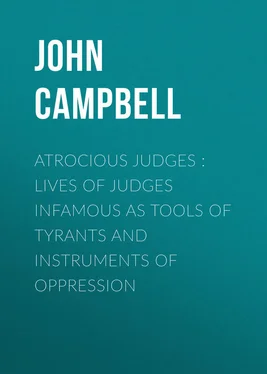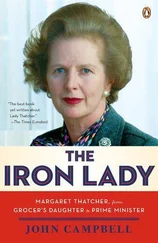John Campbell - Atrocious Judges - Lives of Judges Infamous as Tools of Tyrants and Instruments of Oppression
Здесь есть возможность читать онлайн «John Campbell - Atrocious Judges - Lives of Judges Infamous as Tools of Tyrants and Instruments of Oppression» — ознакомительный отрывок электронной книги совершенно бесплатно, а после прочтения отрывка купить полную версию. В некоторых случаях можно слушать аудио, скачать через торрент в формате fb2 и присутствует краткое содержание. Жанр: foreign_antique, foreign_prose, Биографии и Мемуары, на английском языке. Описание произведения, (предисловие) а так же отзывы посетителей доступны на портале библиотеки ЛибКат.
- Название:Atrocious Judges : Lives of Judges Infamous as Tools of Tyrants and Instruments of Oppression
- Автор:
- Жанр:
- Год:неизвестен
- ISBN:нет данных
- Рейтинг книги:5 / 5. Голосов: 1
-
Избранное:Добавить в избранное
- Отзывы:
-
Ваша оценка:
- 100
- 1
- 2
- 3
- 4
- 5
Atrocious Judges : Lives of Judges Infamous as Tools of Tyrants and Instruments of Oppression: краткое содержание, описание и аннотация
Предлагаем к чтению аннотацию, описание, краткое содержание или предисловие (зависит от того, что написал сам автор книги «Atrocious Judges : Lives of Judges Infamous as Tools of Tyrants and Instruments of Oppression»). Если вы не нашли необходимую информацию о книге — напишите в комментариях, мы постараемся отыскать её.
Atrocious Judges : Lives of Judges Infamous as Tools of Tyrants and Instruments of Oppression — читать онлайн ознакомительный отрывок
Ниже представлен текст книги, разбитый по страницам. Система сохранения места последней прочитанной страницы, позволяет с удобством читать онлайн бесплатно книгу «Atrocious Judges : Lives of Judges Infamous as Tools of Tyrants and Instruments of Oppression», без необходимости каждый раз заново искать на чём Вы остановились. Поставьте закладку, и сможете в любой момент перейти на страницу, на которой закончили чтение.
Интервал:
Закладка:
“This petition is unnecessary, and not to the purpose; for it is manifest, and ought to be admitted by all the prelates and barons, and commonalty of Scotland, that the king, our master, has performed all his promises to them. As to the conduct of his judges, lately deputed by him as SUPERIOR and DIRECT LORD of that kingdom, they only represent his person; he will take care that they do not transgress his authority, and on appeal to him he will see that right is done. If the king had made any temporary promises when the Scottish throne was vacant, in derogation of his just suzeraineté , by such promises he would not have been restrained or bound.” 27 27 This is the very ground upon which it is attempted, now, to justify the repeal of the Missouri prohibition of slavery, while Brabacon’s defence of English judges in Scotland is a counterpart to the justification by our federal judges of the authority given to slave-catching commissioners. — Ed.
Encouraged by this language, Macduff, the Earl of Fife, entered an appeal in the English House of Lords against the King of Scotland; and, on the advice of Brabacon and the other judges, it was resolved that the respondent must stand at the bar as a vassal, and that, for his contumacy, three of his principal castles should be seized into the king’s hands.
Although historians who mention these events designate Brabacon as “grand justiciary,” it is quite certain that, as yet, he was merely a puisne judge; but there was a strong desire to reward him for his services, and, at last, an opportune vacancy arising, he was created chief justice of the King’s Bench.
Of his performances in this capacity we know nothing, except by the general commendation of chroniclers; for the Year Books, giving a regular account of judicial decisions, do not begin till the following reign.
On the accession of Edward II., Brabacon was reappointed chief justice of the King’s Bench, and he continued very creditably to fill the office for eight years longer. He was fated to deplore the fruitless result of all his efforts to reduce Scotland to the English yoke Robert Bruce being now the independent sovereign of that kingdom, after humbling the pride of English chivalry in the battle of Bannockburn. 28 28 May the pending attempts of the Southern States, countenanced and supported by the federal judges, to establish a “superiority” and “direct dominion” over the north, be met and repelled with similar spirit and success! — Ed.
At last, the infirmities of age unfitting Brabacon for the discharge of judicial duties, he resigned his gown; but, to do him honor, he was sworn a member of the Privy Council, and he continued to be treated with the highest respect till his death, which happened about two years afterwards.
CHAPTER II.
ROBERT TRESILIAN
We next come to a chief justice who actually suffered the last penalty of the law – and deservedly – in the regular administration of retributive justice – Sir Robert Tresilian – hanged at Tyburn.
I can find nothing respecting his origin or education, except a doubtful statement that he was of a Cornish family, and that he was elected a fellow of Exeter College, Oxford, in 1354. The earliest authentic notice of him is at the commencement of the reign of Richard II., when he was made a serjeant at law, and appointed a puisne judge of the Court of King’s Bench. The probability is, that he had raised himself from obscurity by a mixture of good and evil arts. He showed learning and diligence in the discharge of his judicial duties; but, instead of confining himself to them, he mixed deeply in politics, and showed a determination, by intrigue, to reach power and distinction. He devoted himself to De Vere, the favorite of the young king, who, to the great annoyance of the princes of the blood, and the body of the nobility, was created Duke of Ireland, was vested for life with the sovereignty of that island, and had the distribution of all patronage at home. By the influence of this minion, Tresilian, soon after the melancholy end of Sir John Cavendish, 29 29 He had been murdered by a body of insurgent peasants headed by Jack Straw, one of the leaders in Wat Tyler’s insurrection. — Ed.
was appointed chief justice of the King’s Bench; and he was sent into Essex to try the rebels. The king accompanied him. It is said that, as they were journeying, “the Essex men, in a body of about 500, addressed themselves barefoot to the king for mercy, and had it granted upon condition that they should deliver up to justice the chief instruments of stirring up the rebellion; which being accordingly done, they were immediately tried and hanged, ten or twelve on a beam, at Chelmsford, because they were too many to be executed after the usual manner, which was by beheading.”
Tresilian now gained the good graces of Michael de la Pole, the lord chancellor, and was one of the principal advisers of the measures of the government, being ever ready for any dirty work that might be assigned to him. In the year 1385, it was hoped that he might have got rid, by an illegal sentence, of John of Gaunt, who had become very obnoxious to the king’s favorites. But the plot got wind, and the Duke, flying to Pontefract Castle, fortified himself there till his retainers came to his rescue.
In the following year, when there was a change of ministry, Tresilian was in great danger of being included in the impeachment which proved the ruin of the chancellor; but he escaped by an intrigue with the victorious party, and he was suspected of having secretly suggested the commission signed by Richard, and confirmed by Parliament, under which the whole power of the state was transferred to a commission of fourteen barons. He remained very quiet for a twelvemonth, till he thought that he perceived the new ministers falling into unpopularity, and he then advised that a bold effort should be made to crush them. Meeting with encouragement, he secretly left London, and, being joined by the Duke of Ireland, went to the king, who was at Nottingham, in a progress through the midland counties. He then undertook, through the instrumentality of his brother judges, to break the commission, and to restore the king and the favorite to the authority of which it had deprived them. His plan was immediately adopted, and the judges, who had just returned from the summer assizes, were all summoned in the king’s name to Nottingham.
On their arrival, they found not only a string of questions, but answers, prepared by Tresilian. These he himself had signed, and he required them to sign. Belknappe, the chief justice of the Common Pleas, and the others, demurred, seeing the peril to which they might be exposed; but, by promises and threats, they were induced to acquiesce. The following record was accordingly drawn up, that copies of it might be distributed all over England: —
“Be it remembered, that on the 25th of Aug., in the 11th year of the reign of K. Rich. II., at the castle of Nottingham, before our said lord the king, Rob. Tresilian, chief justice of England, and Robt. Belknappe, chief justice of the common bench of our said lord the king, John Holt, Roger Fulthorp, and Wm. de Burg, knights, justices, &c., and John de Lokton, the king’s serjeant-at-law, in the presence of the lords and other witnesses under-written, were personally required by said lord the king, on the faith and allegiance wherein to him the said king they are bound, to answer faithfully unto certain questions hereunder specified, and to them then and there truly recited, and upon the same to declare the law according to their discretion, viz.: —
“1. It was demanded of them, ‘Whether that new statute, ordinance, and commission, made and published in the last parl. held at Westm., be not derogatory to the loyalty and prerogative of our said lord the king?’ To which they unanimously answered that the same are derogatory thereunto, especially because they were against his will.
Читать дальшеИнтервал:
Закладка:
Похожие книги на «Atrocious Judges : Lives of Judges Infamous as Tools of Tyrants and Instruments of Oppression»
Представляем Вашему вниманию похожие книги на «Atrocious Judges : Lives of Judges Infamous as Tools of Tyrants and Instruments of Oppression» списком для выбора. Мы отобрали схожую по названию и смыслу литературу в надежде предоставить читателям больше вариантов отыскать новые, интересные, ещё непрочитанные произведения.
Обсуждение, отзывы о книге «Atrocious Judges : Lives of Judges Infamous as Tools of Tyrants and Instruments of Oppression» и просто собственные мнения читателей. Оставьте ваши комментарии, напишите, что Вы думаете о произведении, его смысле или главных героях. Укажите что конкретно понравилось, а что нет, и почему Вы так считаете.












